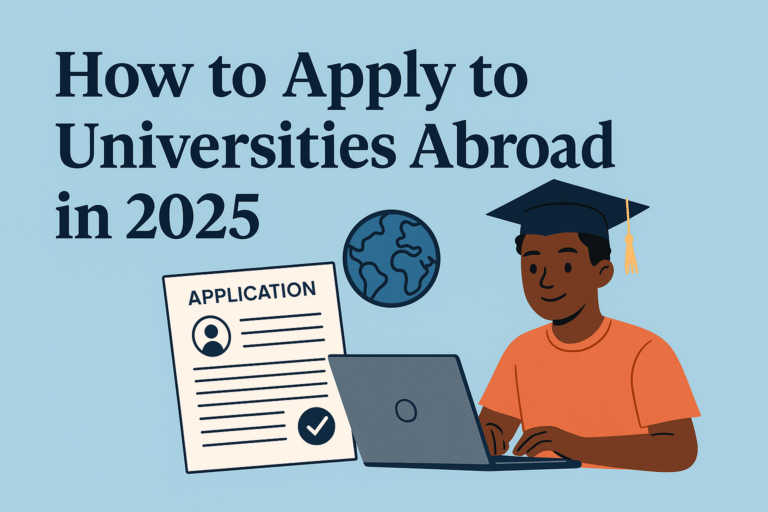25 Life-Changing Benefits of Studying Abroad in 2025
Studying abroad is far more than an academic milestone, it’s a transformative journey that fundamentally reshapes your worldview, career prospects, and personal development. In today’s interconnected global economy, international education has become a powerful catalyst for success, offering students unprecedented opportunities to thrive in an increasingly competitive job market.
The landscape of international education in 2025 presents remarkable opportunities for ambitious students. With the proliferation of tuition-free universities, fully funded scholarships, and post-study work opportunities across Europe, Asia, and North America, pursuing higher education abroad has never been more accessible or rewarding.
This comprehensive guide explores 25 compelling benefits of studying abroad that extend far beyond traditional classroom learning. Each benefit is grounded in real-world relevance and demonstrates the long-term value that international education brings to your personal and professional life.
The Global Education Revolution in 2025
The international education sector has undergone a dramatic transformation in recent years. Universities worldwide are actively competing for top international talent by offering innovative programs, reducing financial barriers, and creating more inclusive admission processes. This shift has created a golden opportunity for students seeking world-class education without the traditional financial burden.
Countries like Germany, Norway, and Finland have established themselves as leaders in affordable international education, offering tuition-free or low-cost programs to international students. Simultaneously, English-taught programs have expanded globally, making quality education accessible to students regardless of their native language or location.
Academic and Educational Advantages
1. Access to World-Class Education and Research Facilities
International universities consistently rank among the world’s best educational institutions, offering cutting-edge programs, research opportunities, and industry connections that are often unavailable in students’ home countries. Top-ranked universities in countries like the United States, United Kingdom, Canada, and Australia provide access to Nobel Prize-winning faculty, state-of-the-art laboratories, and extensive research facilities.
These institutions offer specialized programs in emerging fields such as artificial intelligence, sustainable energy, biotechnology, and space exploration. Students benefit from smaller class sizes, personalized attention from professors, and access to resources that can significantly enhance their academic experience and future career prospects.
2. Study in Tuition-Free or Low-Cost Countries
One of the most compelling advantages of studying abroad in 2025 is the availability of high-quality education at minimal cost. Public universities in Norway, Germany, Finland, and other European countries offer tuition-free education to international students, including those from non-EU countries.
Germany’s public universities charge minimal administrative fees (typically €150-350 per semester) while providing world-class education in engineering, business, and sciences. Similarly, Norway’s public universities offer completely free tuition for international students, making quality education accessible to students from all economic backgrounds.
3. Access to Specialized Programs and Unique Academic Opportunities
Many international universities offer niche programs and specializations that may not be available in your home country. These include cutting-edge fields such as:
- Space law and policy
- Marine biology and oceanography
- Renewable energy engineering
- International development studies
- Digital marketing and e-commerce
- Artificial intelligence ethics
- Sustainable business practices
Studying these specialized programs abroad provides students with unique expertise and competitive advantages in emerging job markets.
4. Experience Different Education Systems and Teaching Methods
International education exposes students to diverse pedagogical approaches and learning methodologies. European universities often emphasize independent research and critical thinking, while Asian institutions may focus on collaborative learning and practical application. American universities typically combine theoretical knowledge with hands-on experience through internships and co-op programs.
This exposure to different educational philosophies helps students develop versatile learning skills and adaptability that serve them throughout their careers.
Language and Communication Benefits
5. Improve Language Skills Through Immersion
Studying abroad provides unparalleled opportunities for language acquisition and improvement. Whether you’re studying in an English-speaking country to perfect your English skills or learning a new language like German, French, or Mandarin, immersion accelerates language learning beyond what’s possible in traditional classroom settings.
Multilingual abilities are increasingly valuable in the global job market, with bilingual professionals often earning 5-20% more than their monolingual counterparts. Countries like Canada, Switzerland, and Singapore particularly value multilingual professionals in their diverse, international business environments.
6. Study in English Without IELTS Requirements
Many universities in 2025 have relaxed their English language testing requirements, accepting alternative proofs of proficiency such as:
- Previous education in English-medium institutions
- Completion of English-taught degree programs
- Duolingo English Test scores
- Cambridge English qualifications
- University-specific English assessments
This flexibility eliminates the cost and stress associated with standardized language exams while still ensuring students can succeed in English-taught programs.
Career and Professional Development
7. Gain Global Work Opportunities and Experience
International education opens doors to global career opportunities that would otherwise be inaccessible. Many countries offer post-study work permits that allow graduates to gain valuable professional experience:
- Canada: Up to 3 years of work authorization for graduates
- Australia: 2-4 years depending on qualification level
- Germany: 18 months to seek employment plus work authorization
- Netherlands: 1-3 years depending on degree level
These opportunities allow students to build international work experience, develop professional networks, and potentially secure permanent employment in their host countries.
8. Boost Your Resume with International Experience
Global employers increasingly prioritize candidates with international experience, recognizing that studying abroad develops crucial soft skills including adaptability, cultural intelligence, and problem-solving abilities. A survey by the Institute of International Education found that 91% of employers consider study abroad experience advantageous when hiring.
International education demonstrates to employers that candidates can:
- Adapt to new environments and challenges
- Communicate effectively across cultures
- Think creatively and solve problems independently
- Work collaboratively in diverse teams
- Navigate complex situations with confidence
9. Access to Enhanced Career Services and Job Placement
Universities abroad typically offer comprehensive career services tailored to international students, including:
- Resume and cover letter writing workshops
- Interview preparation and practice sessions
- Job search strategies for international markets
- Networking events with industry professionals
- Career fairs featuring multinational companies
- Alumni mentorship programs
These services are specifically designed to help international students navigate the global job market and secure positions with top employers worldwide.
10. Enter High-Demand Fields with Better Job Prospects
Graduates from international institutions often have access to high-paying careers in rapidly growing industries such as:
- Technology and software development
- Data science and analytics
- Cybersecurity and information systems
- International business and finance
- Healthcare and biotechnology
- Renewable energy and sustainability
- Digital marketing and e-commerce
International education provides the technical skills, global perspective, and professional networks necessary to excel in these competitive fields.
Financial and Economic Advantages
11. Increased Scholarship Opportunities and Funding
The availability of scholarships for international students has expanded significantly in 2025. Governments, universities, and private organizations offer numerous fully funded scholarships that cover tuition, accommodation, and living expenses. Popular scholarship programs include:
- DAAD scholarships for Germany
- Erasmus+ programs for European Union
- Chevening scholarships for the United Kingdom
- Fulbright programs for the United States
- Government of Canada scholarships
- Australia Awards scholarships
These opportunities make international education financially accessible to students from diverse economic backgrounds.
12. Affordable Living Costs in Emerging Study Destinations
Many countries offer excellent education quality at significantly lower living costs compared to traditional study destinations. Countries such as:
- Poland: High-quality education with monthly living costs of €400-600
- Malaysia: English-taught programs with living costs of $300-500 monthly
- Portugal: EU education standards with affordable Mediterranean lifestyle
- Czech Republic: Central European education at Eastern European prices
- Mexico: North American proximity with Latin American affordability
These destinations allow students to maximize their educational investment while experiencing rich cultural environments.
13. Learn Financial Responsibility and Money Management
Managing finances in a foreign country teaches valuable life skills including budgeting, currency conversion, international banking, and resource optimization. Students learn to:
- Create and maintain budgets in foreign currencies
- Navigate international banking systems
- Understand exchange rates and financial planning
- Develop cost-effective living strategies
- Manage student loans and financial aid
These financial literacy skills provide long-term benefits throughout students’ professional careers.
Personal Growth and Development
14. Personal Growth and Increased Confidence
Living independently in a foreign country accelerates personal development and builds confidence in ways that domestic education cannot match. Students develop:
- Independence and self-reliance
- Problem-solving skills and resourcefulness
- Emotional resilience and adaptability
- Cultural sensitivity and global awareness
- Leadership abilities and initiative
These personal qualities are highly valued by employers and contribute to long-term career success.
15. Cultural Intelligence and Global Awareness
International education develops cultural intelligence—the ability to work effectively across different cultural contexts. This includes understanding:
- Cultural norms and communication styles
- Business practices and professional etiquette
- Social customs and relationship building
- Conflict resolution across cultures
- Global perspectives on social and political issues
Cultural intelligence is increasingly important in our interconnected world and provides significant advantages in international business and diplomacy.
16. Develop a Global Mindset and Worldview
Exposure to different cultures, ideologies, and perspectives broadens students’ worldview and helps them develop a global mindset. This includes:
- Understanding global interconnectedness
- Appreciating cultural diversity and differences
- Developing empathy and cross-cultural communication skills
- Recognizing global challenges and opportunities
- Building inclusive and collaborative approaches to problem-solving
This global perspective is essential for leadership roles in multinational organizations and international relations.
Networking and Relationship Building
17. Expand Your Professional Network Globally
International universities provide unparalleled networking opportunities through:
- Diverse student communities from around the world
- International faculty and visiting scholars
- Industry partnerships and guest lectures
- Professional associations and student organizations
- Alumni networks spanning multiple countries
- Career fairs and industry events
These connections often lead to job opportunities, business partnerships, and lifelong professional relationships that span continents.
18. Build Multicultural Collaboration Skills
Working on projects with students from different cultural backgrounds enhances collaboration skills and prepares students for international work environments. This experience teaches:
- Effective communication across language barriers
- Conflict resolution in diverse teams
- Cultural sensitivity in professional settings
- Inclusive leadership and team management
- Creative problem-solving through diverse perspectives
Lifestyle and Travel Benefits
19. Enjoy Travel Opportunities and Cultural Exploration
Studying abroad provides easy access to travel and cultural exploration, particularly in regions like Europe and Southeast Asia where multiple countries are easily accessible. Students can:
- Explore historical sites and cultural landmarks
- Experience different cuisines and traditions
- Learn about art, music, and literature from various cultures
- Develop travel skills and cultural adaptability
- Create lasting memories and personal experiences
20. Experience Different Lifestyles and Living Arrangements
International education exposes students to different ways of living, from Scandinavian hygge to Mediterranean lifestyle, Asian collectivism to North American individualism. This exposure helps students:
- Appreciate different approaches to work-life balance
- Understand varying social structures and community values
- Develop flexibility and adaptability
- Gain perspective on their own cultural values
- Make informed decisions about future living arrangements
Technology and Innovation Exposure
21. Access to Advanced Technology and Innovation
Many international universities are at the forefront of technological innovation, providing students with access to:
- Cutting-edge research facilities and equipment
- Advanced software and technological tools
- Innovation labs and entrepreneurship centers
- Industry partnerships and internship opportunities
- Startup incubators and business development programs
This exposure to technology and innovation prepares students for careers in rapidly evolving fields and entrepreneurial ventures.
22. Prepare for Remote Work and Digital Nomadism
International education often aligns with remote work preparation, teaching students:
- Digital collaboration tools and platforms
- Cross-cultural communication in virtual environments
- Time management across different time zones
- Independent project management and self-direction
- Technology skills for remote work success
These skills are increasingly valuable as remote work becomes more prevalent in the global economy.
Long-term Life Benefits
23. Pathway to Permanent Residency and Citizenship
Many students use international education as a pathway to permanent residency in their host countries. Countries like Canada, Australia, and Germany offer immigration programs specifically designed for international graduates, including:
- Points-based immigration systems favoring graduates
- Provincial nomination programs for in-demand skills
- Skilled worker visa categories
- Entrepreneur and investor visa options
- Family reunification programs
24. Learn Adaptability and Resilience
International education builds mental flexibility and resilience through:
- Adapting to new climates and environments
- Navigating different food cultures and dietary options
- Adjusting to varying social customs and expectations
- Managing homesickness and cultural adjustment
- Developing coping strategies for challenges and setbacks
These adaptive skills are valuable throughout life and contribute to personal and professional success.
25. Create Lifelong Memories and International Friendships
Perhaps most importantly, studying abroad creates lifelong memories and international friendships that enrich students’ lives for decades. These relationships often lead to:
- Lifelong personal and professional connections
- Opportunities for international travel and visits
- Cultural exchange and continued learning
- Business partnerships and collaborations
- A global support network spanning multiple countries
Conclusion
Studying abroad in 2025 represents one of the most impactful investments you can make in your future. With unprecedented access to tuition-free universities, English-taught programs, comprehensive scholarships, and post-study work opportunities, international education has never been more accessible or valuable.
The benefits extend far beyond academic achievement, encompassing personal growth, professional development, cultural intelligence, and global networking opportunities that will serve you throughout your career. Whether you’re seeking specialized knowledge, international experience, or simply a transformative life adventure, studying abroad provides the foundation for success in our interconnected world.
As global employers increasingly value international experience and cultural competence, students who choose to study abroad position themselves at the forefront of the global job market. The skills, perspectives, and connections gained through international education create opportunities that simply cannot be replicated through domestic study alone.
The time to act is now. With countries worldwide competing for international talent and universities offering more support than ever before, 2025 presents an unprecedented opportunity to transform your future through international education. Your journey toward global success begins with a single decision to study abroad a decision that will reshape your life in ways you never imagined possible.






